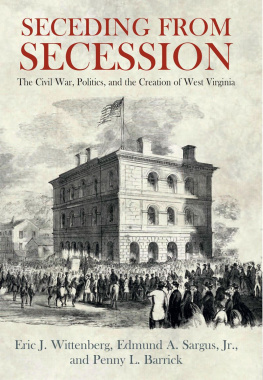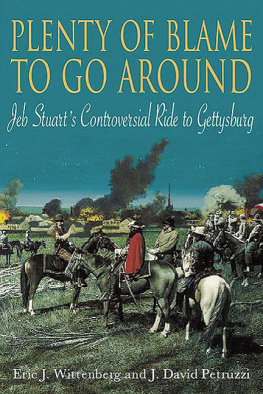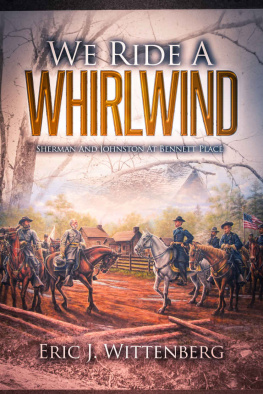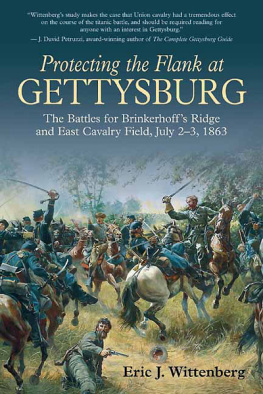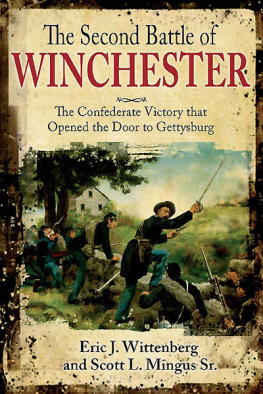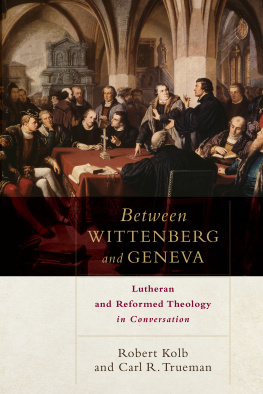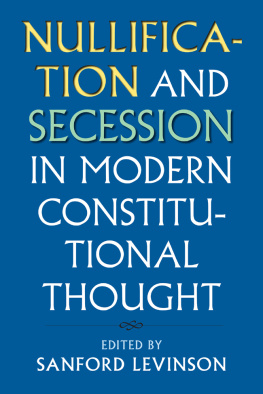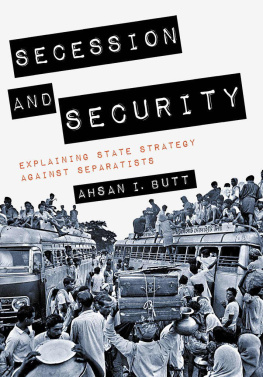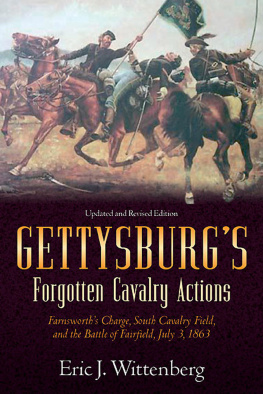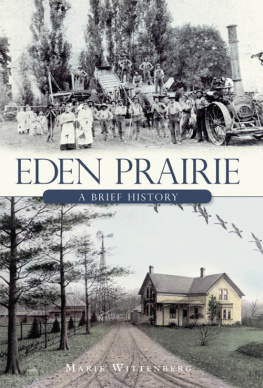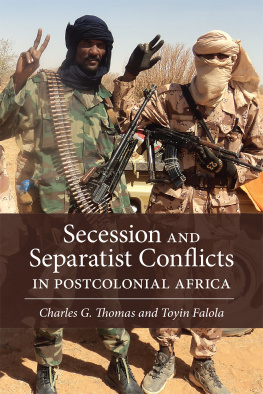Eric J. Wittenberg - Seceding from Secession
Here you can read online Eric J. Wittenberg - Seceding from Secession full text of the book (entire story) in english for free. Download pdf and epub, get meaning, cover and reviews about this ebook. year: 2020, publisher: Savas Beatie, genre: Politics. Description of the work, (preface) as well as reviews are available. Best literature library LitArk.com created for fans of good reading and offers a wide selection of genres:
Romance novel
Science fiction
Adventure
Detective
Science
History
Home and family
Prose
Art
Politics
Computer
Non-fiction
Religion
Business
Children
Humor
Choose a favorite category and find really read worthwhile books. Enjoy immersion in the world of imagination, feel the emotions of the characters or learn something new for yourself, make an fascinating discovery.
- Book:Seceding from Secession
- Author:
- Publisher:Savas Beatie
- Genre:
- Year:2020
- Rating:3 / 5
- Favourites:Add to favourites
- Your mark:
- 60
- 1
- 2
- 3
- 4
- 5
Seceding from Secession: summary, description and annotation
We offer to read an annotation, description, summary or preface (depends on what the author of the book "Seceding from Secession" wrote himself). If you haven't found the necessary information about the book — write in the comments, we will try to find it.
Seceding from Secession — read online for free the complete book (whole text) full work
Below is the text of the book, divided by pages. System saving the place of the last page read, allows you to conveniently read the book "Seceding from Secession" online for free, without having to search again every time where you left off. Put a bookmark, and you can go to the page where you finished reading at any time.
Font size:
Interval:
Bookmark:

The Civil War, Politics, and the Creation of West Virginia
Eric J. Wittenberg,
Edmund A. Sargus, Jr., and Penny Barrick

Savas Beatie
California
2020 Eric J. Wittenberg, Edmund A. Sargus, Jr. and Penny Barrick
All rights reserved. No part of this publication may be reproduced, stored in a retrieval system, or transmitted, in any form or by any means, electronic, mechanical, photocopying, recording, or otherwise, without the prior written permission of the publisher.
Library of Congress Cataloging-in-Publication Data
Names: Wittenberg, Eric J., 1961- author. | Sargus, Edmund A., Jr., 1953- author.
| Barrick, Penny L., author.
Title: Seceding From secession: The Civil War, Politics, and the Creation of West Virginia
/ by Eric J. Wittenberg, Edmund A. Sargus, Jr., and Penny L. Barrick.
Other titles: Civil War, politics, and the creation of West Virginia
Description: California: Savas Beatie [2020] | Includes bibliographical references and index.
| Summary: This book is the first modern study of the events that led to the creation of the State of West Virginia. It includes both historical and legal analysis and places those important events in their proper historical contextProvided by publisher.
Identifiers: LCCN 2020007694 | ISBN 9781611215069 (hardcover) |
ISBN 9781611215076 (ebook)
Subjects: LCSH: West VirginiaPolitics and government1861-1865. |
West VirginiaHistoryCivil War, 1861-1865. | Statehood (American politics)
Classification: LCC F241 .W73 2020 | DDC 975.4/03dc23
LC record available at https://lccn.loc.gov/2020007694
ISBN-13: 9781611215069
eISBN: 9781611215076
Mobi ISBN: 9781611215076
First Edition, First Printing

Savas Beatie
989 Governor Drive, Suite 102
El Dorado Hills, CA 95762
916-941-6896 /
All of our titles are available at special discount rates for bulk purchases in the United States. Contact us for information.
I believe the admission of West Virginia into the Union is expedient.
President Abraham Lincoln, December 31, 1862
by Frank J. Williams
S OMETHING like 65,000 books have been published on the Civil War, more than one a day since it ended, while 16,000 of those books are about Abraham Lincoln himself. Between all those books, their studied narratives and storytelling, those authors and the country as a whole has a tremendous lack of consensus about what the Civil War means.
The Civil War has invited more speculation about whether it could have been avoided, or turned out differently than any event in American history. What if Lincoln had assented to Southern succession? What if, in the winter of 1860-61, Congress and the states had adopted a constitutional amendment assuring the perpetuity of slavery? What if one army, during one of the many battles of the Civil War, had destroyed the other army completely? What if President Lincoln had vetoed the bill creating the state of West Virginia? Yet, none of these questions tell us what the war was all about.
Abraham Lincoln holds our nations mind like no other president. He lived at the dawn of photography, and his pine cone face made a haunting picture. He was the best writer in all American politics, and his words are even more powerful than his images. His greatest trial, the Civil War, was the nations greatest trial, and the race problem that caused it is still with us today. Lincolns murder, a poignant and violent climax to the Civil War, allowed future generations, including our own, to consider the what-ifs.
Abraham Lincoln did great things, greater than anything done by Theodore Roosevelt or Franklin Roosevelt. He freed the slaves and saved the Union, and because he saved the Union he was able to free the slaves. Beyond this, however, our extraordinary interest in him, and esteem for him, has to do with what he said and did. And much of this had to do with the Unionwhat it was and why it was worth saving.
He saved it by fighting and winning the war, of course. But his initial step in this was the decision to go to warnot a popular decision, and certainly not an easy one. His predecessor, the incompetent James Buchanan, believed that the states had no right to secede from the Union, but that there was nothing he could do about it if they did.
After the southern states began seceding, Lincoln clearly understood that the time had come when the only way to save the Union was to go to war. However, he was forced to consider whether he could say this and retain the support of the people who had voted for him? To his abolitionist supporters, slavery was a sin, and the slaveholders sinners. Yet, William Lloyd Garrison, was no friend of the Union. Garrison believed that the Constitution was a covenant with death and an agreement with hell. Garrison even said, [d]uring the Fort Sumter crisis all Union saving efforts are simply idiotic.
Demographic historian J. David Hacker, using a sophisticated analysis of census records, estimated the death toll of the war at 750,000, twenty percent more than originally believed.
President Lincoln confronted many challenges: the first conscription in America, defining war powers of the president, civil liberties in war time, martial law, plans for Reconstruction, and admission of new states including West Virginia.
Lincoln was not keen on admitting West Virginia as it had seceded from Virginiawhich was a state and Lincoln would never concede that it, and other so called Confederate states, had left the Union.
West Virginia was created out of necessity in the midst of the Civil War, and admitted to the Union in 1863. Many maintain that the admission of West Virginia to the Union was completed on less than constitutional grounds. The North coveted the creation and admission of West Virginia to the Union, but Article IV, Section 3.1 of the Constitution required, and requires to this day, the approval of the original state legislature to create the state of the original states boundaries.
The settlers in the counties west of the Alleghenies of the original Virginia had an uneasy relationship with the remainder of the state. The counties that make up the current West Virginia were insufficient to gain the prestige and prominence of planters and plantation slavery. Those in the western counties complained of a state government that overtaxed and underrepresented them.
These western counties shared miles of border with both Ohio and Pennsylvania. The river system that created natural borders also provided for the flow of population and commerce. The people of Virginias western counties were more intimately connected with those Pennsylvanians and Ohioans, more so than their fellow Virginians.
And as Virginia took steps to secede from the Union, the people in the western counties opposed such secession. Virginias January 1861 call for a state convention ignored precedent that required a popular vote to sanction such a call. That convention, from February into April, discussed the issue of secession. The new Confederacy was represented there, and its supporters packed the galleries, while also threatening delegates by hanging nooses from lampposts. Delegates from the western counties of Virginia, latter day West Virginia, voted against secession on April 4. But fifteen days later, the convention voted to secede.
Font size:
Interval:
Bookmark:
Similar books «Seceding from Secession»
Look at similar books to Seceding from Secession. We have selected literature similar in name and meaning in the hope of providing readers with more options to find new, interesting, not yet read works.
Discussion, reviews of the book Seceding from Secession and just readers' own opinions. Leave your comments, write what you think about the work, its meaning or the main characters. Specify what exactly you liked and what you didn't like, and why you think so.

